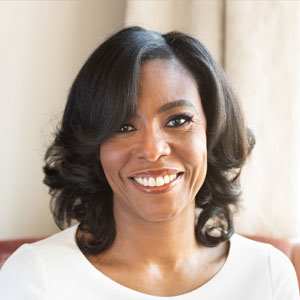A Conversation With Emily and Vipula

Emily Dickens
Chief of Staff and Head of Government Affairs at SHRM

Vipula Gandhi
Managing Partner and Global Head of Enterprise Business at Gallup
Networks provide access to ideas, resources, support, role models and human connection -- and working women need all of those things, stat.
So say Emily Dickens, chief of staff and head of government affairs at the Society for Human Resource Management, and Vipula Gandhi, managing partner and global head of enterprise business at Gallup. "Gallup has studied wellbeing, and the data are clear that we need connections to have a life well-lived," Gandhi says. "And feeling cared for is a big part of engagement and wellbeing."
According to Dickens and Gandhi, a supportive, effective network isn't just "people you know professionally" -- it's a community built on genuine connections, strengthened by vulnerability, generosity and intentionality. And contrary to outdated notions of networks, quality is much more important than quantity. "The key to a good network is depth, not breadth," Dickens says. "You may know 500 people, but if you want a job reference or someone to pick your child up from school or take your parent to a doctor's appointment, you need to know exactly who to reach out to at the right time."
That's reason enough for women to cultivate their networks, as Dickens and Gandhi relate in the following Q&A with Gallup Senior Editor Jennifer Robison, but organizations have a vested interest in working women's networks too. The alarmingly high stress level and quit rate among female employees threaten leadership pipelines, innovation, talent benches, DEI initiatives, employee value propositions and profitability. Networks can reduce those risks -- and improve women's wellbeing at work and at home. "Opening yourself up to people, expanding your social network, really makes your life better," Dickens says.
Robison: Why are networks so important?
Dickens: I learned early that I had to get outside myself and be intentional about leveraging my networks. I grew up in New York City and went to school in North Carolina. I was a C student my first semester because I didn't know anybody -- I would go to class and then right back to my dorm. Then I connected with the Student Government Association president, who was also a New Yorker, and by second semester I had a 3.8 [GPA], was volunteering in student government, connecting with others and getting rides home for holidays. That experience changed everything. Opening yourself up to people, expanding your social network, really makes your life better.
Gandhi: Those networks of people are access to resources, ideas, connections, support and a forum to share. We need human connections, professional or personal. Gallup has studied wellbeing, and the data are clear that we need connections to have a life well-lived, and feeling cared for is a big part of engagement and wellbeing. So if we want a life well-lived, we need to build connections and networks to support us professionally and personally. And right now, the stress level of working women is higher than that of men -- 62% of working women in the U.S. and Canada report experiencing stress "a lot of the day" the previous day, compared with 52% of men. Women's engagement is usually significantly higher than men's. During the pandemic, women's engagement had a sharper decline than men's, while still maintaining the lead by a small margin. Obviously, society puts a lot of demands on women's time, and working women had even more responsibilities during the pandemic. It drove 2.5 million more women than men out of the workforce. So women need networks because they really help us practically, psychologically and professionally. And we need to be intentional about growing them.
Dickens: Vipula, I completely agree about intentionality. The key to a good network is depth, not breadth, and you make deep networks with intentionality. You may know 500 people, but if you want a job reference or someone to pick your child up from school or take a parent to an appointment, you need to know exactly who to reach out to at the right time. People you can call who will answer. I haven't changed my phone number since 2002 so that people I haven't talked to in years can reach me. You don't have to have a lot of people in your network, but you do need people you're really connected with.
Robison: Does having a network affect how people experience their jobs?
Dickens: Our employee engagement surveys show that SHRM departments that are really engaged are also well-networked. You might think an employee who's always all over the building, always talking to someone, is the gossipy employee, but that is the connected employee. She's engaged, she's happy and she knows who to talk to in order to get things done. To really thrive and have a life well-lived, you have to have a work experience that is personal. You need to create relationships that outlast your time with the company. Unfortunately, this can be difficult for many professionals. SHRM's new report on women in leadership shows that female managers, especially female managers of color, are less likely than male managers to feel included in key networks at their organization. For example, our survey showed that 56% of female managers of color feel they can talk about their personal life at work versus 79% of white male managers.
Gandhi: Emily, that's a great point about the work experience. Before leaders think about how to build communities for women in their organization, they need to get clear on why they should. Research shows mentorship and sponsorship are really helpful to women and people from non-majority groups, but finding a mentor who shares your experience isn't always easy if you're in a minority. And almost all professional women feel a lack of confidence at some point. Women in leadership experience imposter syndrome at a higher rate than men do. As leaders, we need to encourage those relationships that build women's confidence and competence. A work experience that feels personal, like you said, Emily, has significant positive effects on women. Women are often the caretakers, but they also need to be cared for. If women can strongly agree someone cares about them in their organization, the organization will probably excel in ways that go beyond the bottom line. It's just the right thing to do. That said, there is a very strong business case for gender diversity.
Robison: How so?
Gandhi: Data show gender diversity is better for companies in every way: It helps them reach out to new customer bases, deepens the talent pool, fosters diversity of ideas and innovation, and retains star talent. Unfortunately, during the "Great Resignation," the U.S. workforce lost 1.8 million women workers, which means fewer women in the leadership pipeline. And because so many women and people of color want to stay remote or hybrid, I see a great risk in inherent proximity bias. If the people you see most often are the people who get promoted, remote or hybrid workers will be pulled back -- which means women and people of color will be less likely to advance. Companies must develop performance systems ready for the expectations of the workplace today, and equity and inclusion is an expectation of the workplace. Those systems must focus on outcomes, not the processes that achieve them, with an EVP [employee value proposition] that offers a differentiated and effective employee experience. The disclosure economy will continue to make organizations publicly responsible for retaining and promoting female talent in the workforce. So there's a huge business case for why. Now, how? The same way you would with any demographic, by studying the experience of the group in that organization. Study women's experience, and place effective interventions to make it better. Consider life cycle surveys, contrast studies, proactively designing formal or informal networking opportunities, etc. Organizations have to proactively support talented women and get them into the pipeline to leadership. How can you get women on boards if they're not working through the hierarchy of the organization? Supporting and investing in diversity is the right thing to do, while marginalizing people is not, not morally or organizationally. It's much better to recruit and retain all the talented people you can -- develop, coach and network them, and level your playing field. Organizations that don't do this well, where women don't thrive, face high risks.
Robison: Speaking of risks, what do you think about networking on social media? Should you follow coworkers on Twitter and the like?
Dickens: Be selective. There are people you meet whom you want to stay engaged with, people you have something in common with outside of work. But otherwise, keep your social media private. With a professional site like LinkedIn, you can be strategic with a professional glimpse into your personal side so people can know you. Every now and again, I post a story about how my mom inspires me. When I became a trustee at my alma mater, I posted a picture of my husband and me in the chancellor's box because it was such a full-circle moment for us. You can bring people over the wall, every now and again, in a professional way on social media. But be very careful. I see things on LinkedIn that make me cringe.
Gandhi: Social media has pros and cons. I've seen social media used effectively -- it can help leaders understand what motivates their team members, what excites them, what they value, and build deeper relationships. But I agree, Emily -- select people with whom you have a real relationship outside of work to maximize the pros while minimizing the cons. Be true to yourself, be thoughtful, but social media can help you maintain your network and be there for your people in their time of need.
Robison: People can be reluctant to ask for help when they need it. How should we get past that? Or is a little reluctance healthy?
Dickens: There's something healthy about being a little reluctant to ask just anybody for something. It is better to be thoughtful and be sure you're asking the right person for help, someone who is a real connection, who has the right expertise. I'd recommend thinking carefully about the scope of the relationship so that you don't misuse the opportunity. But if the risk of not asking outweighs the risk of asking for help, then do it.
Gandhi: I agree. And I'd add, be generous in giving. Generosity gives us the right to ask for support when we need it because we've invested in that relationship and earned that trust. So before you ask for help, ask yourself if you helped. Did you step up when their family member was sick? Did you cover for them when they were on vacation? Did you do all you could to help them? That's why I like the phrase "community building" versus "networking." "Networking" suggests short-term, selfish focus. "Community building" suggests long-term, generous relationship investment. But to make that connection, to build your community, you need to be vulnerable. Vulnerability is having the courage to open up and relinquish your fears of rejection. It's the key to connection. Vulnerability fosters trust and empathy, which builds stronger bonds. But asking for help is hard. This is why having role models and sharing experiences by building communities matters so much. It gives women leaders a chance to share, exchange and learn they're not alone. You get confidence from learning you're not alone, confidence gives you conviction, and conviction leads to success. So if you're reluctant to reach out, remember that generosity is key to asking for help, vulnerability is key to connection, and sharing and role modeling are really important.
Robison: How would you recommend building communities in an organization?
Dickens: I've been intentional about developing relationships with people on my executive team. I'll give you an example. I love giving back, so I love that we have a foundation. The president is very forward-thinking, and I really wanted to get to know her better. So first I made a donation -- it is a foundation -- then I asked if my team could help hers, be a resource for her on joint policy initiatives, etc. How can I help her do her job? Now we're figuring out how we can bring resources back to the organization, and she's a good colleague. I ended up getting much more than I gave by being intentional and generous. Getting to know your colleagues by figuring out how to help them is a great way to build your community. It's a great thing to do for your organization, especially your people managers. They are under incredible strain. They have to be empathetic and understanding, agile and flexible, and get the job done while managing in a new and different environment. There's a woman in a people manager's seat somewhere who's trying to make the world work for everyone in her orbit, and it's not going to work for everybody. She has to hire a team she can best work with, and there's nothing wrong with that. Men have been doing it forever. There's too much pressure on managers to create perfect environments. Understand the big picture and how you can create an environment where you can do better by leveraging the networks in that environment.
Robison: So, think back to your first job. If you could give your younger self some advice about building a network, what would it be?
Dickens: Everyone is not your competition. My first real job was as a cashier at a supermarket. It was a summer job and I was in high school, but I'm so competitive that I decided I'd be the best employee, sign up for all the overtime, and would be the front-end manager by the end of the summer. That meant I automatically disliked the person who already had the job. What I should have done is get to know her, learn what she knew, learn how she got that position, who she knew, how she got there. I should have asked how someone her age got to be a front-end manager instead of competing with her and spending a whole summer with such negative energy.
Gandhi: My focus should have been on the skills and knowledge I was gaining and the people I was getting to know. My first job was as a management trainee in a five-star hospitality organization, I was 22, and all I was thinking about was what's my next job, what's my next job? I didn't realize a career is a marathon, not a sprint. You need to pace yourself because there will be phases in your life, times when you're running fast and times when you're moving slow. I learned customer centricity in the hospitality industry and that I have a genuine desire to help clients. That transcends industry, education and time. I should have thought long-term and believed that the dots would connect. And thinking long-term would have helped me and the people around me.
For the workplace to succeed, women need to succeed:
-
Progress isn't possible without women. Check out our International Women's Day page to see the data and read the stories about how women are really doing.
